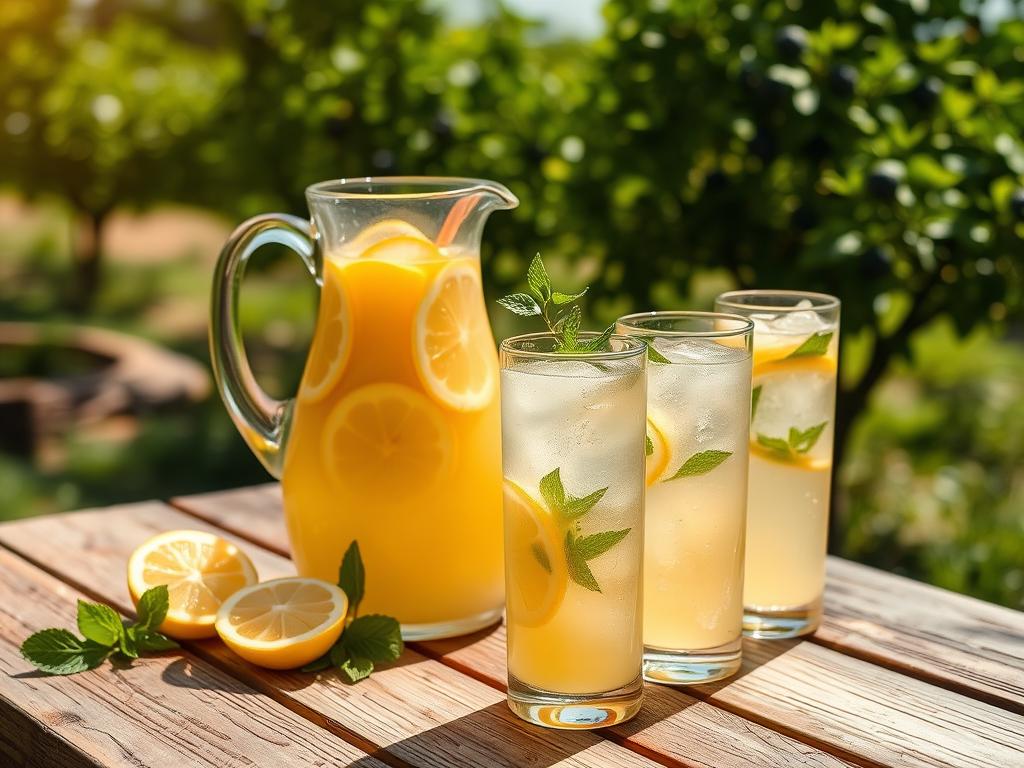There’s something magical about that first sip of homemade lemonade on a hot afternoon. I still remember my grandma’s sunlit kitchen, where she’d stir together fresh-squeezed lemons and just the right touch of sweetness—a simple ritual that made ordinary days feel special. Today, we’re capturing that same sunshine-in-a-glass feeling with some of the best lemonade recipes to brighten your warm-weather moments.
We’ve perfected a classic blend using three pantry staples you likely already have. Unlike complicated dishes, this crowd-pleaser comes together faster than you can slice a lemon wedge. Whether you’re hosting a backyard BBQ or need a pick-me-up after gardening, our method guarantees that perfect tang-to-sweet ratio every time.
Skip the bottled stuff – we’ll show you why fresh citrus makes all the difference. Our video tutorial (complete with pro tips!) walks you through each step, from juicing techniques to presentation tricks. That final lemony garnish? It’s not just pretty – it adds a burst of aroma that store-bought versions can’t match.
Key Takeaways
- Three-ingredient formula for effortless preparation
- Video guide simplifies the mixing process
- Fresh citrus elevates flavor over bottled alternatives
- Balanced sweetness enhances natural tartness
- Garnishing tips boost visual appeal and aroma
Summer Lemonade Recipes: A Refreshing Introduction
Three ingredients stand between you and summer’s ultimate thirst-quencher. Fresh lemon juice, cold water, and a touch of sweetness transform into a vibrant drink that cools like nothing else. We’ve seen countless backyard parties where this classic lemonade recipe steals the show – and it’s easier than you think!
The magic happens in the balance. Too much citrus puckers lips, while insufficient sweetness misses the mark. Our method uses precise ratios perfected through years of testing. Measure your lemon juice first – its tartness determines how much water and sugar you’ll need. Pro tip: Let the mixture rest 10 minutes before serving. This lets flavors marry beautifully.
| Feature | Homemade | Store-Bought |
|---|---|---|
| Fresh Citrus | ✓ (4-6 lemons) | ✗ (Concentrate) |
| Prep Time | 8 minutes | 0 minutes |
| Sweetness Control | Adjustable | Fixed |
| Artificial Additives | None | Common |
Our video instructions break down each step visually – ideal for first-timers. You’ll learn to juice lemons efficiently and create that signature tangy-sweet kick. Best part? This isn’t just a beverage. It’s a hydration hero packed with vitamin C and zero preservatives.
Ready to stir up something unforgettable? Grab your pitcher – we’re diving into the simple techniques that make this summer staple shine!
Gathering Essential Ingredients and Tools
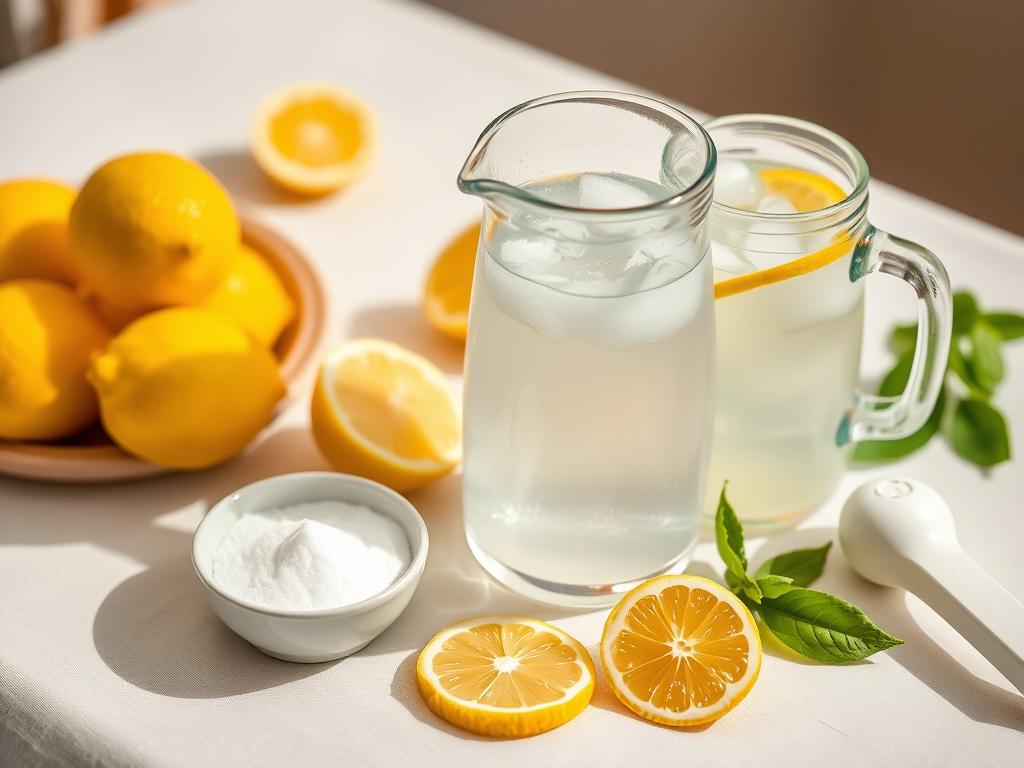
Every great drink starts with quality components laid out on your counter. We’ve learned that prepping your supplies first turns hectic mixing into a joyful ritual. Here’s everything you’ll need to create that bright, balanced flavor profile.
Detailed Ingredient List
Start with 6-8 fresh lemons – their vibrant juice forms the drink’s backbone. You’ll combine this with 1 cup granulated sugar and 6 cups cold water. These simple ingredients work best when measured precisely, so keep your measuring tools handy.
Skip bottled lemon juice. Freshly squeezed liquid has brighter acidity and natural oils that bottled versions lack. For perfect sweetness, use standard measuring cups to portion your sugar and water.
Must-Have Tools for Lemonade Making
A sturdy glass pitcher is your mixing hub, while a small saucepan helps dissolve sugar into silky syrup. We recommend a handheld lemon squeezer for efficient juicing, though a fork works if you’re improvising!
| Ingredient | Quantity | Tool | Purpose |
|---|---|---|---|
| Lemons | 6-8 medium | Juicer | Extract 1 cup juice |
| Granulated sugar | 1 cup | Saucepan | Create syrup base |
| Water | 6 cups | Pitcher | Combine ingredients |
Pro tip: Microwave lemons for 10 seconds before squeezing – it softens them for maximum yield! With these accessible tools and fresh ingredients, you’re set for success.
Step-by-Step Process for Making Homemade Lemonade
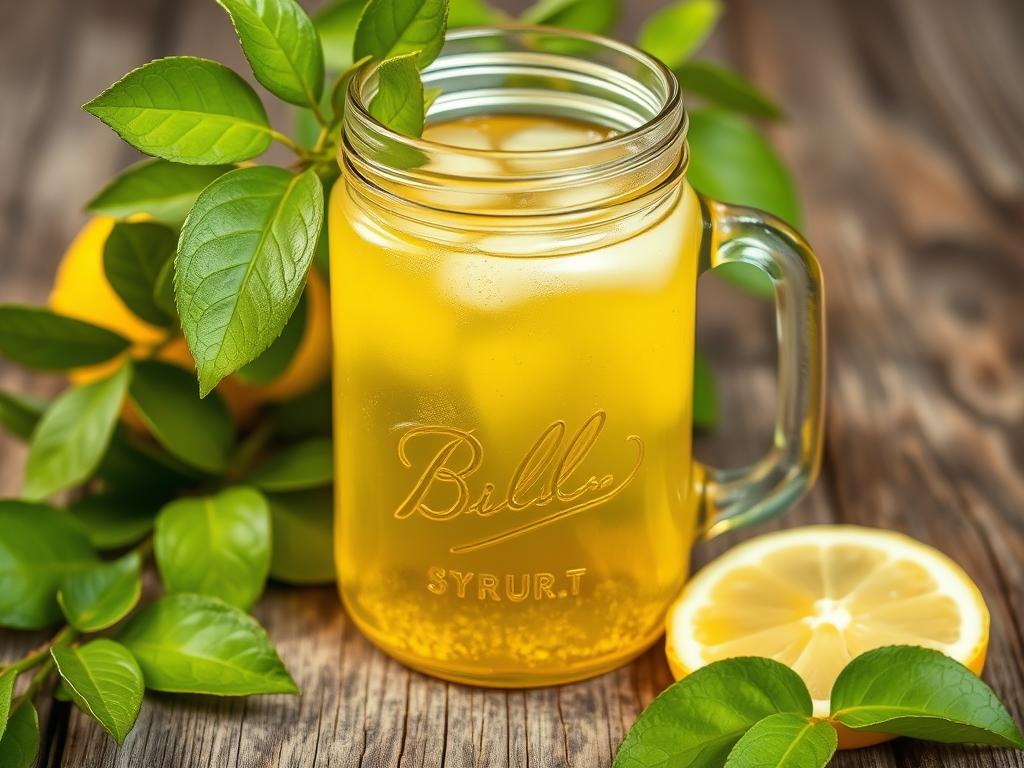
Crafting your own refreshing drink starts with mastering one key element: the syrup base. We’ve found that nailing this step transforms ordinary mixtures into sip-worthy creations. Let’s walk through each stage together – you’ll be stirring like a pro in no time!
Perfecting the Simple Syrup Technique
Combine 1 cup sugar and 1 cup water in a saucepan. Warm them over medium-low heat, stirring until crystals dissolve completely – about 3 minutes. Resist boiling! This gentle approach prevents caramelization, keeping flavors clean and bright.
Let the syrup cool 10 minutes. This waiting period lets it thicken slightly while staying pourable. Meanwhile, squeeze 6-8 lemons to get 1 cup juice. Strain through a fine mesh to remove pulp and seeds for that smooth finish we all love.
Now pour the cooled syrup into your pitcher. Add fresh lemon juice and 4 cups cold water. Stir vigorously – you’ll see the magic happen as colors blend into that classic sunny hue. Taste test here: add water for mellowness or a lemon wedge for extra zing.
| Step | Time | Key Tip |
|---|---|---|
| Syrup Prep | 8 min | Low heat preserves clarity |
| Cooling | 10 min | Essential for proper texture |
| Mixing | 2 min | Stir clockwise for even blend |
Remember: precise measurements make or break your homemade lemonade recipes. Use liquid measuring cups for water and dry cups for sugar. That attention to detail? It’s what separates good from “Can I get your recipe?” great.
Mastering the best lemonade recipes
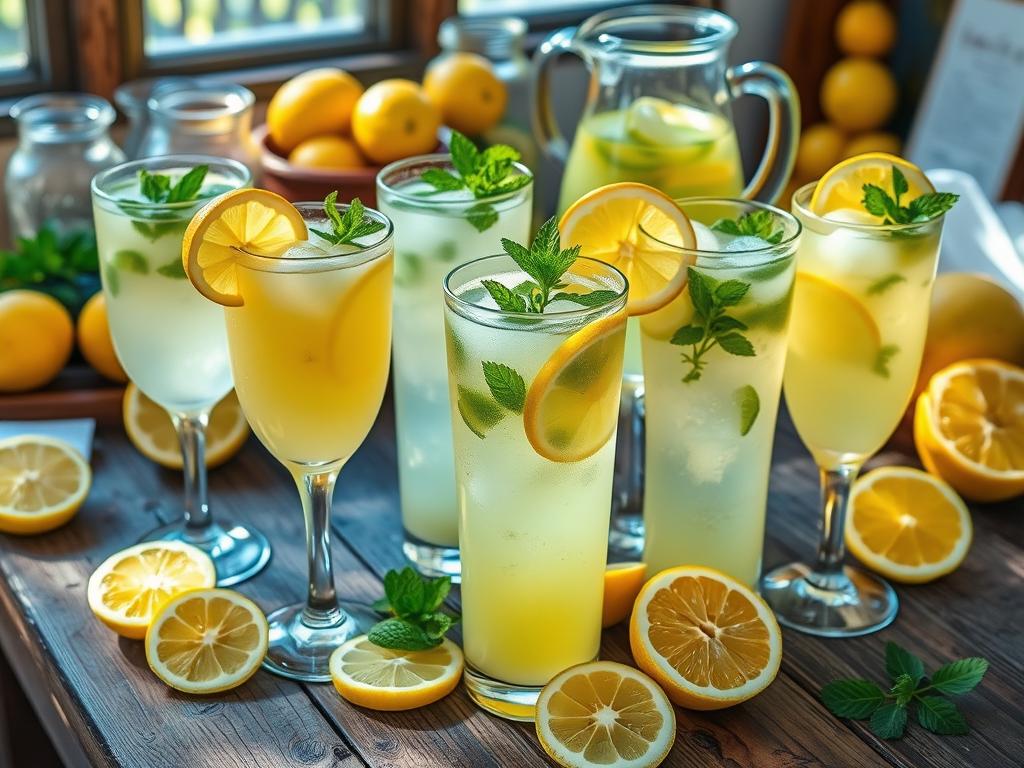
Transforming basic ingredients into art requires understanding flavor dynamics. We’ve discovered three crucial adjustments that separate good mixes from “Wow, what’s your secret?” creations. Let’s unlock your inner mixologist!
Found your drink too puckering? Add ¼ cup honey gradually while stirring – its floral notes soften sharp edges. Too sweet? A tablespoon of fresh juice or dash of citrus zest brings back brightness. Remember: adjustments work best when added in small increments.
- Temperature matters: Chill glasses for extra refreshment
- Sweetener swaps: Try agave or maple syrup for depth
- Citrus blends: Mix lime or orange juice for complexity
| Issue | Quick Fix | Flavor Boost |
|---|---|---|
| Too tart | Add simple syrup (1 tbsp at a time) | Muddle fresh basil |
| Too sweet | Squeeze half lemon directly into pitcher | Float cranberry ice cubes |
Document your experiments in a tasting journal. Note ratios, added ingredients, and reactions from friends. Over time, you’ll develop an instinct for balancing acidity and sweetness like pro bartenders.
We’ve seen home cooks create stunning variations – one added lavender sprigs, another used smoked salt rims. What unique twist will you bring to this classic? Share your discoveries in the comments – let’s build our ultimate community recipe book together!
Variations, Tips, and Creative Twists
Your pitcher of sunshine just got a personality upgrade! We love how a few tweaks can transform the classic citrus drink into something uniquely yours. Let’s explore fun ways to play with flavors while keeping that refreshing foundation intact.
Unexpected Flavor Pairings
Infuse your simple syrup with fresh herbs during the heating phase. Basil adds peppery notes, while mint brings cooling vibes. For fruity flair, muddle ½ cup strawberries per pitcher – their natural sweetness pairs beautifully with tart lemon juice.
| Variation | Add-In | Prep Time |
|---|---|---|
| Tropical Twist | 1/4 cup pineapple juice | +2 minutes |
| Spiced Zing | 1 cinnamon stick (steeped) | +5 minutes |
| Berry Burst | 3 tbsp mashed raspberries | +3 minutes |
Tailoring to Your Taste Buds
Start with our base ratio of 1 cup lemon juice to 6 cups water. Too tangy? Add cooled syrup 1 tbsp at a time. Too mild? Squeeze in extra citrus gradually. Always taste between adjustments – your perfect balance might surprise you!
- Swap white sugar for honey or maple syrup
- Use sparkling water for fizzy texture
- Freeze edible flowers into ice cubes
Keep a notebook nearby to jot down successful combinations. Did lavender syrup make you swoon? Does ginger add that kick you crave? These simple ingredients become your playground – mix fearlessly!
We’ve seen amazing creations from our community, like rosemary-peach blends and chili-lime rims. What will your signature twist be? Share your brightest ideas below – let’s inspire each other!
Serving Suggestions and Nutritional Insights
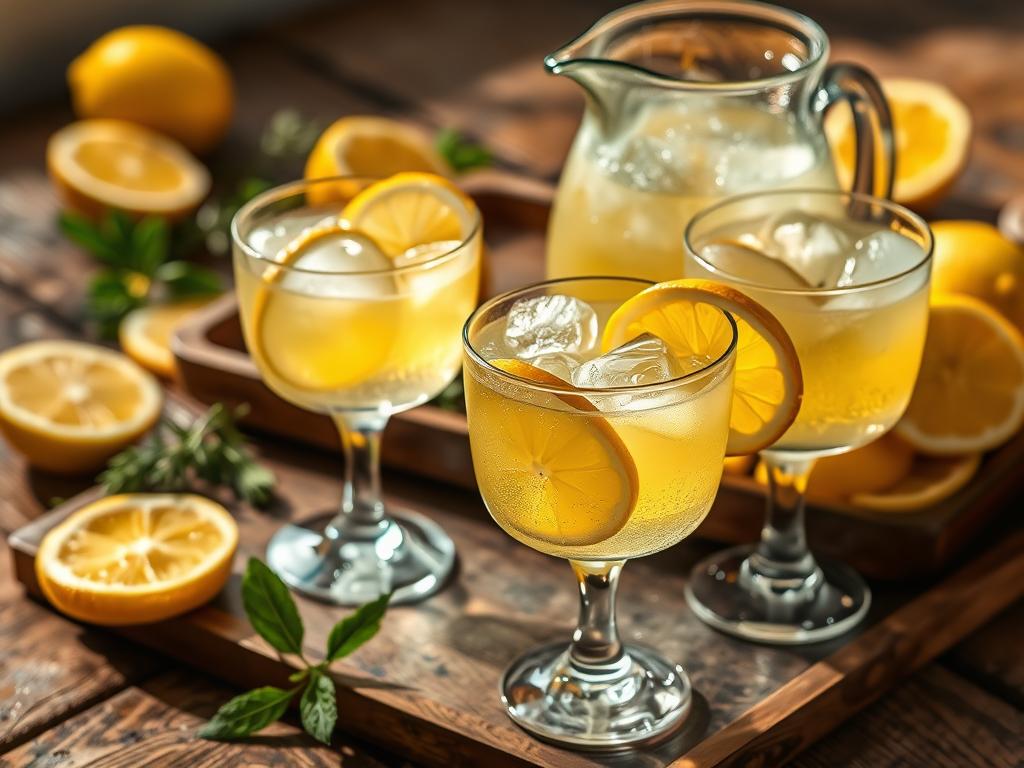
Presentation transforms your pitcher into a summer centerpiece. We love seeing frosty glasses filled with ice and garnished with lemon wheels or basil sprigs. For parties, freeze edible flowers into cubes – they melt into colorful swirls that wow guests.
Each 18-oz glass contains 103 calories and 38% of your daily vitamin C. The simple syrup contributes most of the sugar, but you control the sweetness. Here’s the breakdown per serving:
| Nutrient | Amount | Daily Value |
|---|---|---|
| Calories | 103 | 5% |
| Vitamin C | 23mg | 38% |
| Sugars | 27g | 30% |
Scale the recipe effortlessly. Use a 2-gallon pitcher for cookouts by tripling the ingredients. Quiet evenings? Half the batch works perfectly. Always chill your mix for 30 minutes before serving – it lets flavors deepen.
Pair this drink with grilled chicken skewers or citrus salads. The bright acidity cuts through rich foods beautifully. Remember to taste after chilling – sometimes a splash of water balances the flavor shift from cooling.
Share your creative presentations! Tag us in social media posts featuring mint sprig crowns or raspberry-studded ice rings. Your twist might inspire our next community recipe roundup!
Conclusion
Nothing beats the satisfaction of crafting your own refreshment from scratch. We’ve walked through each step together – from selecting fresh lemons to mastering the simple syrup technique. Remember: precise measurements and quality ingredients make all the difference. Those 8 minutes spent juicing citrus? They’re what create that vibrant tang store-bought versions lack.
Your perfect pitcher awaits with just 1 cup sugar, 6 cups water, and sunshine-bright citrus. Follow our instructions closely, but don’t hesitate to experiment. Add mint sprigs, swap sweeteners, or freeze berry ice cubes. Every twist makes it uniquely yours.
Share your creations using #CitrusCrew – we love seeing your innovations! Need tools? Check our affiliate links for juicers and pitchers that simplify the process. Whether you’re cooling off after yardwork or hosting friends, this drink delivers pure summer joy.
Thank you for joining our kitchen community. Your next culinary adventure? It’s just a post away. Grab those lemons – your brightest, zestiest summer yet starts now!
Transform Your Mornings with Hassle-Free Crockpot Breakfasts! Say goodbye to chaotic mornings and hello to delicious, effortless meals that set the tone for your day. Our latest blog article, “Crockpot Breakfast: Hassle-Free Morning Meals,” is packed with easy recipes that will revolutionize your breakfast routine. Imagine waking up to the mouthwatering aroma of a warm breakfast waiting for you—no more rushing or skipping meals!
Don’t miss out on this opportunity to simplify your mornings and enjoy wholesome, satisfying breakfasts every day. Dive into our blog now and discover how easy it is to make your mornings stress-free! Click here to read the full article and start your journey toward better breakfasts today!

